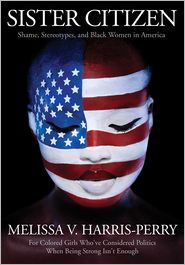The Talk: Sister Citizen: Shame, Stereotypes, and Black Women in America
The Question: What does it feel like to be a black woman in America?
“Black women are vulnerable to collective shame because of simply existing in the American political system,” says the author of Sister Citizen. Shame, she argues –- a product of American racism, lingering stereotypes and media bias -- undermines the very essence of a democracy that counts citizens as equals and allows them meaningful recognition.
Sister Citizen, the author's second book, shares the name of Harris-Perry's weekly column for The Nation. It draws on the fields of political science and literature, combining empirical studies with an interior view of women's lives in an attempt to answer one question: What does it feel like to be a black woman in America?
She says it feels like:
- Living in a “crooked room” where the angles are off, the chair is sideways, and the subject struggles to find the true orientation. “That’s just like being a black woman in America. “You’re walking through the world and the stimuli you’re getting are off-kilter, they’re not consonant of your understanding with your authentic self.”**
- Feeling empowered through the idea of Fictive Kinship -- that women like Harriet Tubman and Sojourner Truth "did incredible things, and because you are their brother or sister you can do incredible things too." ** Feeling weak because "I can also be made less politically active and ashamed by the failures of my unrelated fictive kinship."**
The Nut: Harris-Perry has no easy answers for how to change the stereotypes and help women to become their authentic selves. But public figures such as Michelle Obama have helped to offer alternative realities to the Mammy, the Jezebel, and the Sapphire, even as the trope of the "Strong Black Woman" continues to "terrify and thrill".
*Images courtesy of Jim Crow Museum of Racist Memorabilia (http://www.ferris.edu/jimcrow/jezebel/more/stir.htm), the White House (http://www.flickr.com/photos/whitehouse/3532376714/), The Guardian.
**All italics attributed to Harris-Perry
Effie-Michelle Metallidis is a guest student blogger for the Women and Public Policy Program and Master in Public Policy first-year student at Harvard Kennedy School.




No comments:
Post a Comment